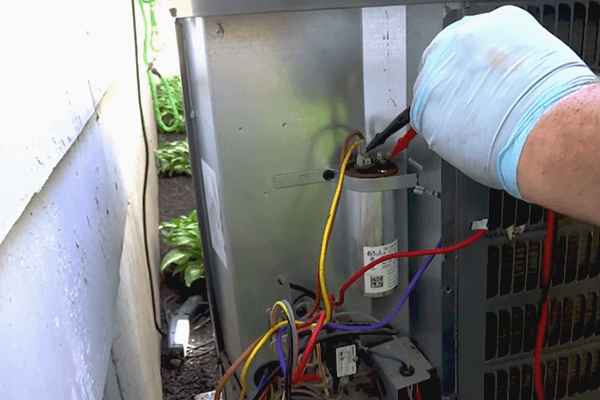There are many basic maintenance tasks you can perform on your own air conditioning system, including changing your air filter and checking for leaks. You should also consider cleaning your air filter to keep your home cool.
If any of these steps fails to bring your air conditioning system back to life, it’s best to contact a qualified AC repair technician for further assistance.

Checking for leaks
If you suspect that your HVAC system may have a leak, you should have it checked by a professional. A leak can damage the performance of your HVAC system and can cause your system to return to its previous state. Luckily, there are several simple ways to detect a leak. One of the easiest methods involves performing a bubble test.
The procedure involves filling a component with air or gas and then submerging it in water since the bubbles created will reveal if there is a leak. Large leaks will typically consume 4.2 ounces or 120 grams of coolant per year. Other ways to detect a leak in your HVAC system include checking for oil spotting. Leaks can occur at any point along the lines and if they are in the valves or fittings, the leak may be easily fixed on-site.
If the leak is in the line set, however, it will need to be replaced. Depending on the size and location of the line set, this task can be simple or complex. For example, replacing a line set that runs through a wall will require more labor than replacing a valve. Leaks can start small and can be caused by various reasons, including factory defects or improper installation.
If left unchecked, they can cause a significant problem, including wasting energy and money. Refrigerants can be toxic if inhaled and deplete the ozone layer. Hence, a professional HVAC repair service like Fox Heating & Air Conditioning should be sought to detect any leaks and fix them immediately. Leaks in an HVAC system can cause serious problems and affect your health and the environment.
Refrigerant lines
If you are a homeowner, you should take some basic safety precautions when dealing with refrigerant lines in your HVAC system. Aside from being dangerous, these lines should be properly routed to prevent mechanical damage. They should be shielded and protected by some type of chase.
If you do not have a chase nor are not sure how to protect them, you can purchase nail plates and install them across exposed framing members. Refrigerant lines are made of copper tubing that moves the gas refrigerant from the evaporator to the condenser. Refrigerant lines are arranged in pairs, with the larger lines carrying gas and smaller ones carrying liquid.
The larger lines are insulated to prevent condensation and improve efficiency. However, mechanical refrigerant lines are often damaged where they enter the house wall. In these cases, leakage will be visible as oil deposits. This damage can also be caused by improper support of the piping which would be the fault of your contractor or landlord.
The lifespan of refrigerant lines is approximately twenty to twenty-five years. However, damage or contamination can shorten their lifespan. To maximize their lifespan, you should ensure that the lines are properly installed and cared for. If properly installed, refrigerant lines will last as long as the rest of the AC unit. If you are looking for an AC repair, consider hiring a professional.
Cleaning air filters
A filter in your HVAC system can collect dirt and debris, including dust. Cleaning it can be a simple process, but you must remember to wear gloves and a face mask while working in the area. If you do not do it properly, you could risk developing respiratory issues.
Also, you should turn off the power before you clean it. Also, make sure to remove the vent covers and vacuum all the loose dirt around the filter before you begin. To begin the process, you must first know the type of air filter you have. Some filters have different cleaning instructions, so knowing which one you have is important.
Additionally, you should replace the filter every two to three months, depending on the manufacturer. Make sure to save the packaging when you purchase a new air filter. You should also mark the replacement date on your calendar. Lastly, make sure to turn off your HVAC unit before you begin the cleaning process to avoid any dirty air from circulating.
If you want to clean the air filter yourself, you must turn off the HVAC unit and remove the old one. Then, take a hose or vacuum and clean the filter. Afterward, you can dry the air filter. Do not forget to close the vents before you start the cleaning process. It is best to contact an HVAC repair professional if you need any assistance.
Safety issues
There is several safety issues associated with HVAC repair. Oftentimes, HVAC contractors in most cities work long hours in very hot conditions. In addition, they are frequently running from one job to another. This can make them tired and make mistakes, which may lead to poor service or installation. Fatigue can also contribute to vehicle accidents if they fall asleep while driving.
Proper safety protocols can minimize the risk of electric shock, which is a major safety concern for HVAC technicians. This can happen almost instantly, and there is no way to reverse it. Hence, safety against electrocution should be the first priority for any HVAC technician. It is also imperative for technicians to use protective gloves while working with electricity. Additionally, it is important to turn off the power to the area before working on it.
Identify the hazards that may pose a risk to the technician and equipment. Every job is different, so the safety guidelines must be tailored to the situation. While completing the job, be careful not to take shortcuts. HVAC technicians have to travel to different locations. Always use appropriate tools for each job site.
